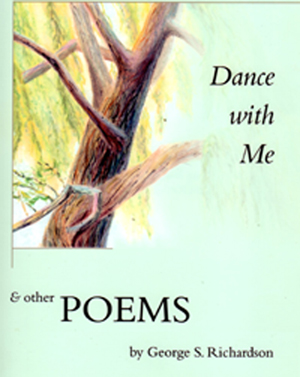Poems by Ministers and Members
of First Church in Boston
17th Century Poets:
Edward Taylor o Anne Bradstreet *
Bay Colony Ministers †
[Bay Psalm Book]
18th Century Poet:
Cotton Mather †
19th Century Poets:
Nathaniel Langdon Frothingham † John Pierpont † Ralph Waldo Emerson †
20th Century Poet:
ee cummings *
21st Century Poets:
John Burt* Heather Campbell* Joan & Leo Collins *
Mary Collins * Adnan Onart* George Richardson *
Symbols: Minister, 7 Societies † Lay Person, 7 Societies * Minister, FCB Orbit o

Edward Taylor was born in 1642, the son of a non-Conformist yeoman farmer.
After studies at Cambridge University, and his employment as a teacher, this nascent poet/minister left England, & in 1668 emigrated to the Bay Colony to enroll in Harvard College with advanced standing. He was received by John Hull, mintmaster and member of FCB. Already in ‘new’ Cambridge, Taylor began his poetry & was chosen to deliver a “verse declamation” upon graduation in 1671.
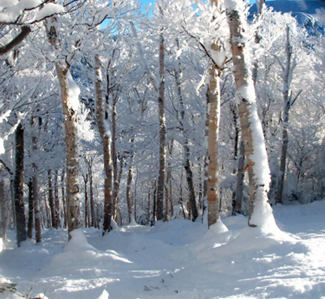 Increase Mather of Boston’s Second Church urged Taylor to accept an invitation to minister in New England’s remote western frontier, in the wilderness town of Westfield, Taylor’s diary records an overland journey in a snowy November, accompanied by Thomas Dewey, the Westfield Church’s representive: “The snow being above mid-leg deep, the way unbeaten, the track filled up yet again, yet over rocks & mountains [we travelled] about 100 miles.”
Increase Mather of Boston’s Second Church urged Taylor to accept an invitation to minister in New England’s remote western frontier, in the wilderness town of Westfield, Taylor’s diary records an overland journey in a snowy November, accompanied by Thomas Dewey, the Westfield Church’s representive: “The snow being above mid-leg deep, the way unbeaten, the track filled up yet again, yet over rocks & mountains [we travelled] about 100 miles.”
Rev. Edward Taylor served in this wilderness setting as minister, physician, farmer, Native American strategist, & poet until his death in 1729 at the age of 68. It is estimated that during this time Taylor filled near 7,000 pages in either
diary or poetic forms.
He kept these writings unknown, however, even forbidding his family to publish them. Discovered in the Yale University Library of which many were published over 200 years later, in 1939, as “The Poetical Works of Edward Taylor,” Thomas H Johnson, editor.
In his English days as reader, student & teacher, Taylor would have become acquainted with the 17th century ‘metaphysical style’ - characterized by ‘inventiveness of metaphor’ - in which the poems are written.
Students of poetry point to unexpected truths, intellectual qualities; & many ‘great thoughts,’ ibid, “the idea that the perfection of beauty in a beloved one acts as a remembrance of perfect beauty in the eternal realm.”
As well, a strong casuistic, subtle & deceptive tone may also be heard, one that is self centered & sophistical, yet defining the poet’s relationship with God.
Other 17th century poets displaying this style were John Donne, Richard Crashaw and Anne Bradstreet.
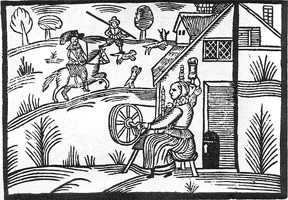
HUSWIFERY
Make me, O Lord, thy Spining Wheele compleate. [compleate - without defect]
Thy Holy Worde my Distaff make for meet
Make mine Affections thy Swift Flyers neate
And make my Soule thy holy Spoole to bee.
My Conversation make to be thy Reele
And reele the yarn thereon spun of thy Wheele.
Make me thy Loome then, knit therein this Twine:
And make thy Holy Spirit, Lord, winde quills: [fill spools with thread]
Then weave the Web thyselfe. The yarn is fine. [Web - cloth]
Thine Ordinances make my Fulling Mills. [cloth beaten & cleaned]
Then dy the same in Heavenly Colours Choice,
All pinks with Varnisht Flowers of Paradise. [pinks - shining]
Then cloath therewith mine Understanding, Will,
Affections, Judgment, Conscience, Memory
My Words, and Actions, that their shine may fill
My wayes with glory and thee glorify.
Then mine apparel! shall display before yee
That I am Cloathd in Holy robes for glory.
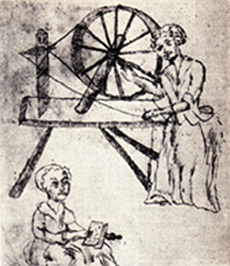
Edward Taylor’s tombstone is in Westfield, MA
The town was incorporated in 1669.
It is just beyond present day Springfield, MA.
LINKS:
Wikipedia
Harvard Square Library
PAL: Perspectives in American Literature
University of North Carolina
The Poems of Edward Taylor, ed. Donald E. Stanford on Google Books

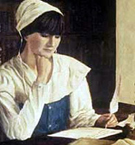 Anne Bradstreet
Anne Bradstreet
Meditation May 13, 1657
As spring the winter doth succeed
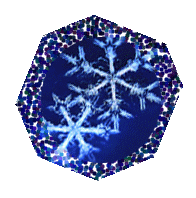 And leaves the naked trees do dress,
And leaves the naked trees do dress,
The earth all black is clothed in green.
At sunshine each their joy express.
My sun's returned with healing wings,
My soul and body doth rejoice,
My heart exults and praises sings
To Him that heard my wailing voice.
My winter's past, my storms are gone,
And former clouds seem now all fled,
But if they must eclipse again,
I'll run where I was succored.
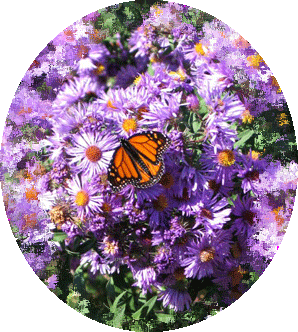
I have a shelter from the storm,
A shadow from the fainting heat,
I have access unto His throne,
Who is a God so wondrous great.
O hath Thou made my pilgrimage
Thus pleasant, fair, and good,
Blessed me in youth and elder age,
My Baca made a springing flood.
O studious am what I shall do
To show my duty with delight;
All I can give is but Thine own
And at the most a simple mite.
LINKS:
Anne Bradstreet

The Bay Psalm Book, 1640 3 Restore my soule dothe hee:
4 Jea though in valley of deaths shade 5 For mee a table thou hast spread, 6 Goodness & mercy surely shall Common Meter 8.6.8.6
Make yee a joyfull sounding noyse
|
The Psalterium Americanum, 1717 PSALM C 1) Now unto the ETERNAL God |
"If any be afflicted, let him pray, and if any be merry, let him sing psalmes." James V.
"If therefore the verses are not alwayes so smooth and elegant as some may desire or expect; let them consider that Gods Altar needs not our pollishings."
John Cotton
"The book of Psalms, in a translation exactly conformed unto the original; but all in blank verse, fitted unto the tunes commonly used in our churches. Which pure offering is accompanied with illustrations, digging for hidden treasures in it; and rules to employ it upon the glorious and various intentions of it. Whereto are added, some other portions of the Sacred Scripture to enrich the Cantional." [Song] Cotton Mather.
Cottton Mather's 'concordance' on the XXIII PSALM
Behold, the Confidence of the Church under the conduct of the Messiah:
He says, in John, Chapter X, verse 11:
I am the Good Shepherd. The good shepherd lays down his life for the sheep.
The Prophets have taught us how to apply the Psalm.
See Isa[iah] Chapter XL, verse 11:
He tends his flock like a shepherd: He gathers the lambs in his arms and carries them close to his heart; he gently leads those that have young.
In Jeremiah XXIII, we find:
Woe to the shepherds who are destroying and scattering the sheep of my pasture, declares the LORD.
Therefore this is what the LORD, the God of Israel, says to the shepherds who tend my people:
Because you have scattered my flock and driven them away and have not bestowed care on them, I will bestow punishment on you for the evil you have done. I myself will gather the remnant of my flock out of all the countries where I have driven them and will bring them back
to their pasture, where they will be fruitful and increase in number. I will place shepherds over them who will tend them, and they will no longer be afraid or terrified, nor will any be missing,
And in Ezekial, Chapter XXXIV, verses 11-17:
For this is what the Sovereign LORD says: I myself will search for my sheep and look after them.
As a shepherd looks after his scattered flock when he is with them, so will I look after my sheep.
I
will rescue them from all the places where they were scattered on a day of clouds and darkness.
I will bring them out from the nations and gather them from the countries, and I will bring them
into their own land. I will pasture them on the mountains of Israel, in the ravines and in all the
settlements in the land. I will tend them in a good pasture, and the mountain heights of Israel will
be their grazing land. There they will lie down in good grazing land, and there they will feed in a
rich pasture on the mountains of Israel.
I myself will tend my sheep and have them lie down, declares the Sovereign LORD. I will search
for the lost and bring back the strays. I will bind up the injured and strengthen the weak, but the
sleek and the strong I will destroy. I will shepherd the flock with justice.
And in I Peter, Chapter II, verse 4 and verse 24:
You were like sheep going astray, but now you have returned to the Shepherd and Overseer of your souls.
And when the Chief Shepherd appears, you will receive the crown of glory that will never fade away.
Finally, in Hebrews, Chapter XIII, verse 20:
May the God of peace, who through the blood of the eternal covenant brought back from the dead our Lord Jesus, that great Shepherd of the sheep, equip you with everything good for doing his will, and may we work in us what is pleasing to him, through Jesus Christ, to whom be glory for ever and ever. Amen. [Translations from the NIV Study Bible]
And, Christians, Why should not you find in your Secular Employments,
the Occasions of Divine, Devout, Heavenly Reflections!
David, a Shepherd, is led by Shepherdy, to think on the Heavenly Shepherd.
Drufius will have David now to think of Samuel’s Anointing of him.
Good and Benignity are Names of the Messiah.
Christian, Thou knowest why He should be called so.
In the Lminous Cloud, which like a Pillar did follow the Church in the Wilderness,
there was a marvellous Presence of the Messiah. May not this be here pointed at!
The Shelter which this Pillar gave, was that of an House.
With some eye to that Moses might say, PSALM XC. 1.
Thou hast been our dwelling place.
O LORD, thou hast been unto us from generation, to generation, a place of fixed mansion.

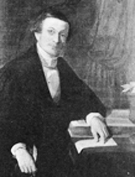 Nathaniel Langdon Frothingham (1793–1870)
Nathaniel Langdon Frothingham (1793–1870)
Berlin TIBER’S yellow flood |
A Summer Evening But see! the sun, long sunk beneath the west, |
LINKS:
Nathaniel Langdon Frothingham's Unitarianism, 1835

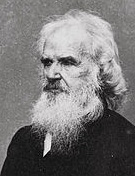 John Pierpoint (1785-1866)
John Pierpoint (1785-1866)
Pierpont was a Unitarian minister and one of the early American poets. His best known text is Jingle Bells. He took on the cause of Abolitionism, and resigned from his position at Hollis Street Church, around 1845 because he was ahead of his congregation on this and other public issues. At the outbreak of the Civil War, at seventy-six years of age, he volunteered as an army chaplain. Owing to poor health, he was transfered to the Treasury Department where he served until his death.
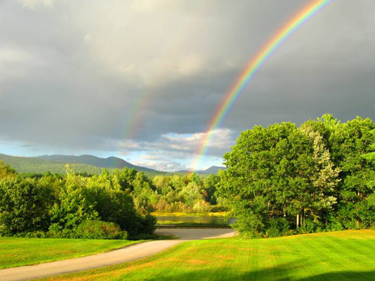 O THOU, to whom in ancient time,
O THOU, to whom in ancient time,
The lyre of Hebrew bards was strung,
Whom kings adored in song sublime,
And prophets praised with glowing tongue;
Not now on Zion's height alone
Thy favored worshipper may dwell,
Nor where, at sultry noon, thy Son
Sat weary by the patriarch's well.
From every place below the skies,
The grateful song, the fervent prayer,
The incense of the heart, may rise
To heaven, and find acceptance there.
O Thou, to whom, in ancient time,
The lyre of prophet bards was strung,
To Thee at last, in every clime,
Shall temples rise, and praise be sung.
GEORGE WASHINGTON
To Thee, beneath whose eye There like an angel form,
Each circling century Sent down to still the storm,
Obedient rolls, Stood Washington:
Our nation, in its prime, Clouds broke and rolled away:
Looked with a faith sublime, Foes fled in pale dismay;
And trusted, in “the time Wreathed were his brows with bay,
That tried men’s souls,” When war was done.
When, from this1 gate of heaven, God of our sires and sons,
People and priest were driven Let other Washingtons
By fire and sword, Our country bless,
And, where thy saints had prayed, And, like the brave and wise
The harenessed war-horse neighed, Of by-gone centuries,
And horsemen’s trumpets brayed Show that true greatness lies
In harsh accord. In righteousness.
Nor was our father’s trust,
Thou mighty One, and just, Sung to America
Then put to shame: 1Old South Church 2Dorchester Heights
“Up to the hills” for light, Written for the Celebration of the Centennial
Looked they in peril’s night, Anniversary of the Birthday of Washington
And, from yon guardian height,2 Boston, February 22, 1832
Deliverance came.
LINKS:
Wikipedia

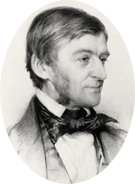 Ralph Waldo Emerson
Ralph Waldo Emerson
The Rhodora |
Two Rivers Thou in thy narrow banks art pent: I see the inundation sweet, Musketaquit, a goblin strong, So forth and brighter fares my stream,-- |
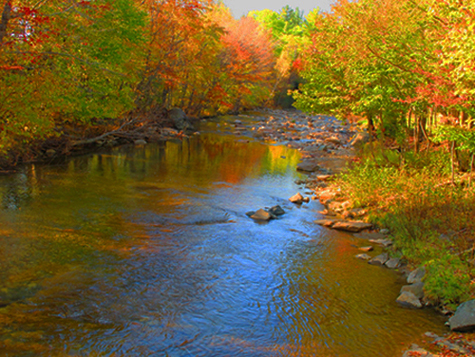
Give All to Love |
Concord Hymn By the rude bridge that arched the flood, The foe long since in silence slept; On this green bank, by this soft stream, Spirit, that made those heroes dare |

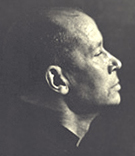 e e cummings
e e cummings
O sweet spontaneous
earth how often have
the
doting
fingers of
prurient philosophers pinched
and
poked
thee
,has the naughty thumb
of science prodded
thy
beauty .how
often have religions taken
thee upon their scraggy knees
squeezing and
buffeting thee that thou mightest conceive
gods
(but
true
to the incomparable
couch of death thy
rhythmic
lover
thou answerest
them only with
spring)
LINKS:
ee cummings: Poet and Painter
Rev Edward Cummings Profile
 Twenty-first Century Poets
Twenty-first Century Poets
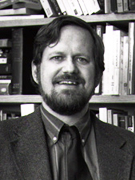 John Burt, Leader Hymn Writers' Workshop
John Burt, Leader Hymn Writers' Workshop
Meeting from 1992 - 2002, members and friends of the Church joined with poet John Burt and composer/editor Leo Collins to give poetic and musical expression to Unitarian Universalist themes, from the Flower Communion to sung poetry based upon the seven covenanted Principles of Unitarian Universalism.
The Hymn Writers
Beverly Allen, Barbara & Stephen Anthony, Peter Banos, Lee Bluemel,
Westin Boer, Shuma Chakravarty, Joan Collins, Mary Collins, Paul Condon,
Brad Cullin, Yvonne Egdahl, Ann Fox, Christine Gainer, David Horst, Doris
Hunter, James H Jackson, Walter Jonas, Elizabeth & Stephen Kendrick,
Karen Larson, Lorna Lynch, Rosemary Mackown, Jane McKinnell, Branden
Miller, Elizabeth Rackemann, Anna & David Reno, George S Richardson,
Robert Schmalz, Vanessa Southern, Cynthia & Gilbert Steil, Jr, and Bill Walters
A Flower in the Wayside Blows Today we bring these gifts of grace Like summer blooms sown far and wide, |
A Never Ending Skein of Stars When late at night we soar across the bleak forbidding sky, When from our dreams we start awake & feel that pulsing tide When I am lost in doubt and dark, and not a soul is by, What sweeps the stars in diamond strands familiar to our eyes |
LINKS:
John Burt

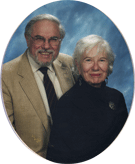 Joan & Leo Collins
Joan & Leo Collins
'Tis a Gift To Be Joyous
Joyous Gifts
Based on the Shaker Hymn
"'Tis a Gift To Be Simple"
‘Tis a gift to be joyous, ‘tis a gift makes us sing,
‘Tis a gift of spirit brightens ev’rything;
It opens up the heart in a way just right
To live in the valley of love and delight.
When simple joyousness is gain’d,
to sing and to dance we shan’t be asham’d,
For joy, joy will be our delight
Till by joyous singing we come ‘round right.
‘Tis a gift to be honest, ‘tis a gift makes you free,
‘Tis a gift that takes you where you want to be.
For when we find ourselves with a truth so right,
‘Twill be in a garden of love and delight.
When simple honesty is gain’d,
To do and to be we shan’t be asham’d,
For truth, truth will be our delight
Till by truthful doing we come ‘round right.
‘Tis a gift to be loving, ‘tis a gift makes you true,
‘Tis a gift to care in all you have to do,
For then we find ourselves with a peace so right
As lives in the valley of love and delight.
When simple charity is gain’d,
To speak and to act we shan’t be asham’d,
For love, love will be our delight
Till by truly loving we come ‘round right.
Hymn Tune for "'Tis a Gift To Be Joyous"
How Did Our World Come to Be? What will happen when we die? If you want to understand Those who search for what is real, Taught by wonder, learning love, |
A Villanelle for Faith Faith is love of all, and it is true.knowledge of world religions makes this plain. Haters may seem many, lovers few, Surely inspired lives give just a clue Love casts out hate. In its all-caring view We must shun violence, and stop it, too — The world, and heaven, are not red, white, and blue. |
Dance with Me
Come dance with me my love Dance by lying on the ground dance on my strong shoulders till "we chase through the branches When we're done with trees and twirling we will pass
|
Deep in the grass till all the dancing grassland till all the dancing meadow |
Morning Prayer If you pray, she says, pure as a child, I am five years old closing my eyes. Essallamü alleykü ve rahmetullah. In Boston, Massachusetts, From that corner of the room, |
The Design of a City This untiring city, İstanbul The sephardic synagogues, almost a rumor, They are all speech acts Old wooden houses O İstanbul, |
When the newly recruited When the Circassian girl When Sultan Osman, the 2nd |
In a narrow street, I was the one who put With my fragile minarets, You left me: I kiss you. You will write poetry. You will suffer all kinds of pains. |
LINKS:
Adnan's Website
Adnan's Blog

 Mary Collins
Mary Collins
Let’s Grow A Rainbow
Based on Unitarian Universalist Principle III -
Acceptance of one another, and encouragement to spiritual growth in our congregations.
 Let’s grow a rainbow ‘round the earth
Let’s grow a rainbow ‘round the earth
in ev’ry season of the year.
We’ll radiate and prize the good
we find in sister/brotherhood.
Let’s grow a rainbow ‘round the earth!
Let’s harvest bright red, yellow swirls
to dance an autumn carnival.
A tempo stok’d by spirit’s bliss
will whirl us into openness.
Let’s grow a rainbow ‘round the earth!
Let’s hum a cool blues mellow verse
in peace of winter’s quiet rest:
Grooving in time, reflecting life,
preparing plans to settle strife.
Let’s grow a rainbow ‘round the earth!
Let’s weave a wreathe, green with the mirth |
Let’s bring a warm gold, glowing faith |
Hymn Tune for "Let's Grow a Rainbow"
If you join your own hand to your own hand, |
|
 The Organ’s Promontory
The Organ’s Promontory
Sharp angles of the organ's silver pipes’ casement
cause a mountainous vertigo from the congregants’ substratum .
Its sound constructs a scaffolding that supplants the placement
of the gray walls in the church’s inner sanctum.
Entranced, she listens, and becomes a prayerful goat-herd
following a white, bearded goat and the forest flute.
Ringing notes, crisp and mellow, bright and shadowed
entice her up and up a timbre-lined route.
As the shutters, as the attack and release of the keys
shade and vary her pathway, she is drawn higher,
the pulling of the stops shifts flauto dolce to reeds,
the colors of the organ transcend beyond the spire,
and finally as the grand jeu is brought into play,
goat and goat-herd kaleidoscope onto the gray.

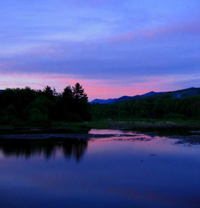
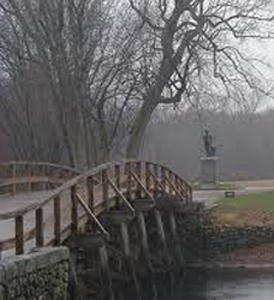
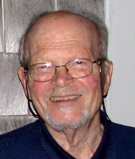 George Richardson
George Richardson